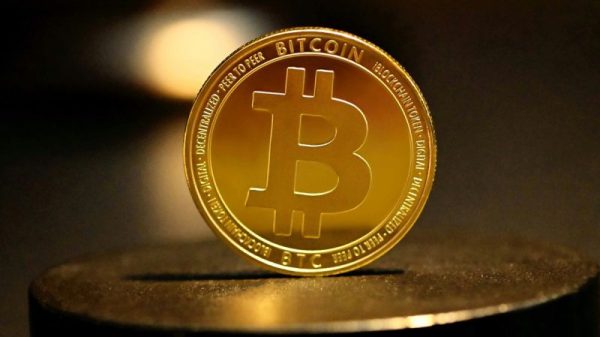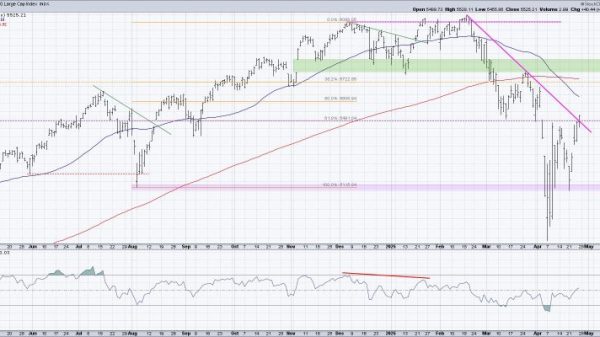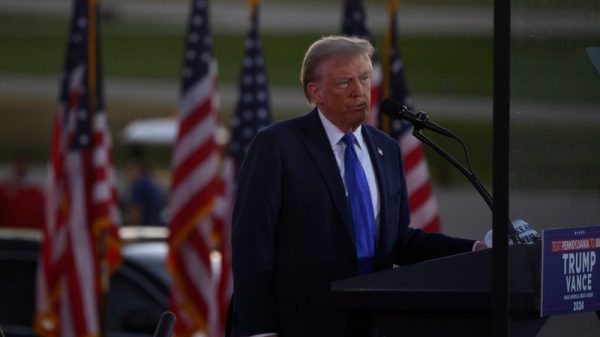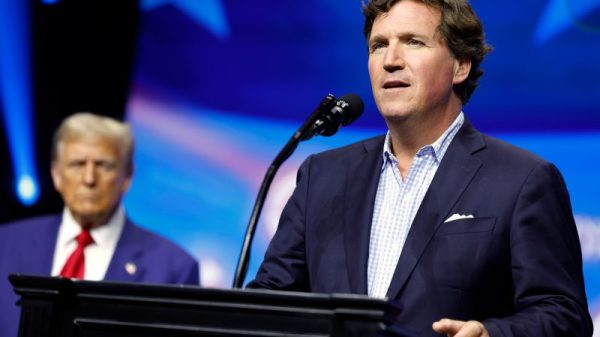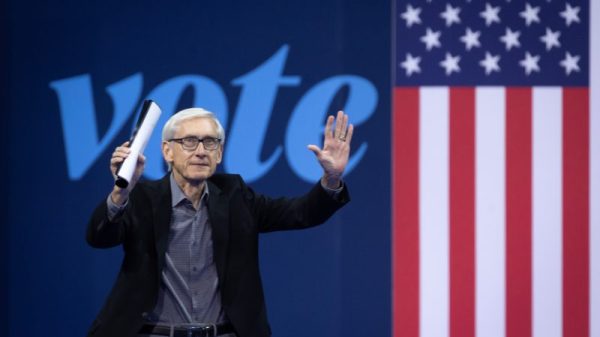NEW DELHI — President Biden arrived here Friday on a four-day trip to Asia aimed at advancing a range of American priorities at a time when deep global divisions are challenging the relevance of the annual gathering of the Group of 20 economic powers.
Biden landed in the Indian capital and immediately headed to a bilateral meeting with Prime Minister Narendra Modi, whom Biden hosted recently for a state visit in Washington and who has been using the conference to bolster his standing at home. At the conclusion of the G-20 meeting Sunday, Biden will make a short stop in Vietnam, a country he is seeking to entice into a partnership against China.
Senior administration officials want to use the summit to advance financial support for developing countries as well as to project confidence in the importance of the G-20 — even as leaders such as Chinese President Xi Jinping and Russian President Vladimir Putin have decided to skip the meeting this year amid tensions over the war in Ukraine.
Upon arriving, Biden was greeted by several officials, including Eric Garcetti, the U.S. ambassador to India, and his daughter, Maya. Loud pop music played from a small stage nearby, and Biden paused briefly to listen and watch dancers before getting into his car to travel to Modi’s residence.
Aside from the meeting with Modi, Biden has planned no other formal bilateral meetings with G-20 participants — other leaders present include Mohammed bin Salman, the crown prince of Saudi Arabia — although there may be informal engagements on the sidelines of the meetings.
No reporters were allowed to cover Biden’s meeting with Modi, a departure from typical practice where photographers and videographers are allowed to record the start of such meetings. Reporters often have an opportunity to shout questions at that point.
U.S. officials have pushed for days to provide some degree of media access to Biden’s meeting with Modi but have met resistance from their Indian counterparts.
“Many of us at very senior levels have been significantly involved in this, but that doesn’t always yield a particular journalist standing in a particular pool spray,” national security adviser Jake Sullivan told reporters aboard Air Force One, using jargon for a photo opportunity. “What we can pledge to you is what’s in our control, which is ensuring that we are transparent and comprehensive in our readout of what the two leaders discussed, which we will.”
Following the meeting, Kurt Campbell, the National Security Council’s coordinator for the Indo-Pacific, said the session showcased a Biden-Modi relationship as one of “undeniable warmth and confidence.”
He said the ties and trust between the two countries were growing stronger, and characterized it as the most important bilateral relationship for this century. Seeking to take advantage of the absence of Xi and Putin as the superpowers vie for India’s allegiance, he also said that “it is a disappointment for India that Russia and China aren’t here.”
“We fully intend to strengthen and deepen our relationship,” Campbell said. “We leave it to China in particular to explain and discuss why they aren’t here — it’s really their business. But for our Indian partners, there’s substantial disappointment that they are not here, and gratitude that we are.”
Heading into two days of meetings involving the world’s largest economic powers, U.S. officials said they hoped to arrive at a joint statement by the end of the summit, something that has become more difficult given the various disagreements between the G-20 members, including on the Russian invasion of Ukraine.
“There’s still some distance to travel before there is a final communiqué released to the public or agreed among the leaders, and we’ll have to see what happens,” Sullivan said.
One of Biden’s top policy goals for the summit is increasing the capacity of the World Bank and International Monetary Fund to lend money to developing countries. Biden has asked Congress to approve more than $3 billion of financing for the World Bank and the IMF, and administration officials have said they think they can get other countries to make similar commitments, significantly increasing the money available.
That effort is largely aimed at providing a counterweight to China’s Belt and Road Initiative, which supplies funding for large infrastructure projects in developing countries. The U.S. effort also reflects the intensifying push-and-pull between the two superpowers as they seek influence and alliances around the world.
Biden also plans to call on other G-20 members to provide debt relief for low- and middle-income countries. The United States also will focus on climate, health and digital technology, Sullivan said, including discussing the promise and peril of artificial intelligence.
“The United States will make it clear that we remain committed to the G-20 as a critical forum for all of the major economies of the world to come together for global problem-solving,” Sullivan said. “At a moment when the international economy is suffering from historic and overlapping shocks, it’s more important than ever that we have a working forum with the world’s largest economies to deliver meaningful outcomes.”
The war in Ukraine is likely also to be a theme of the summit, and Biden plans to emphasize the consequences that the war has had for countries around the world. He also will emphasize that the United States will remain committed to Ukraine.
Ukrainian President Volodymyr Zelensky, who made a surprise in-person appearance at the Group of Seven summit this summer in Hiroshima, Japan, is not expected to attend or give a virtual address.
“From our perspective, anytime President Zelensky gets the opportunity to address a body, a group, is a good thing,” Sullivan said. “We believe that about the G-20. He addressed it last year. But President Zelensky has been relentless in his capacity to engage all of the leaders who are seated at the table,” he added. “So, I feel good about where we are, although the U.S. view is very much that having Zelensky have a role in this G-20 would be a good thing.”
While the G-20 countries managed to agree on a joint communiqué in the last hour at their 2022 summit in Bali, the members have become further polarized since then, reducing the likelihood that such a document emerges this time. For some, the looming possibility of the first G-20 that is unable to bring forth a consensus signals the further disintegration of a multilateral world.
“There’s just a broader breakdown in the global order right now,” said Dinsha Mistree, a research fellow in the program on strengthening U.S.-Indian relations at Stanford’s Hoover Institution. “Gone are the days of globalization, where we see everybody saying, ‘Let’s promote capitalism and open up markets,’ because, well, that’s a thing of the past.”
Xi’s decision to skip the event marks a further deterioration of India-China ties, and Biden expressed disappointment that his Chinese counterpart, with whom he met at last year’s G-20, would not be attending.
“China doesn’t want an India success,” said Indrani Bagchi, a leading foreign policy commentator and head of the Ananta Aspen Center think tank. “China has opposed India for the last decade at every step. China would not want India to have a moment.”
India, however, has its own agenda for the summit, hoping to divert attention from divisions over the war in Europe by focusing on its own economic and diplomatic growth and such pressing global issues such as debt, climate, food and fuel.
“When you look at dysfunctional multilateralism, the G-20 is actually the dream team, because here’s a chance even for the most irascible, irreconcilable contenders and foes to reconcile some of their differences, which they may not be able to reconcile on the battlefield,” said Sujan Chinoy, a former Indian ambassador who now runs India’s main defense think tank. “If you build up a modicum of trust and confidence on larger issues, then it gives some foundation for future peace talks.”
Officials across India have expressed frustration that the Ukraine war is likely to overshadow much of the conversation at the summit.
“India has made the assessment that at present we cannot play a major role in the resolution of the conflict in Ukraine. For that, there are certain prerequisites, including the willingness on the part of the countries involved,” said Ashok Kantha, a former Indian ambassador to China. “The Ukraine conflict has sucked the oxygen out of the international arena. There are other areas which are actually hurting developing countries far more, and somehow those concerns become secondary.”
Biden is to leave India on Sunday on a trip to Vietnam, where he aims to cement an elevated diplomatic relationship with a country that borders China.
Biden’s trip to Hanoi is aimed at reorienting the Pacific region as a counterbalance to China. As he is feted by his hosts, he plans to offer American help in finding remains of Vietnamese soldiers still missing after the Vietnam War of the 1960s and ’70s.
It will be the first time that Biden, who has visited dozens of nations and whose generation was engulfed by the Vietnam War, sets foot in the country.




